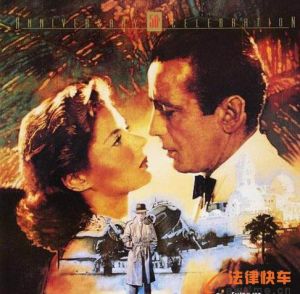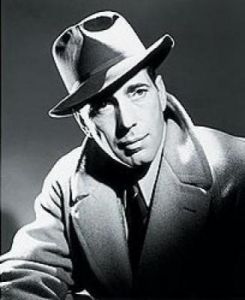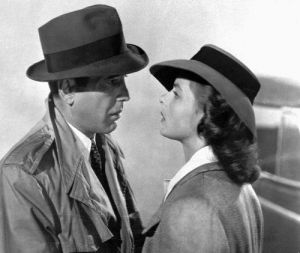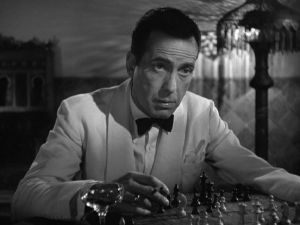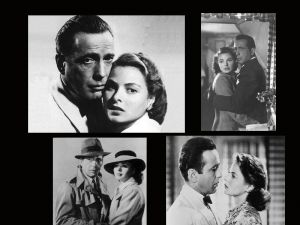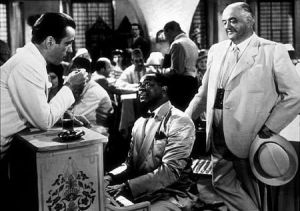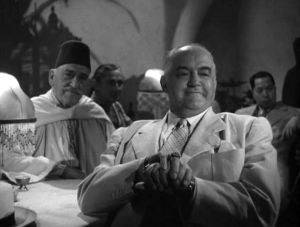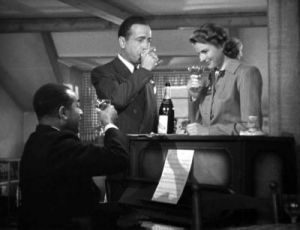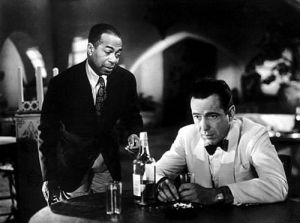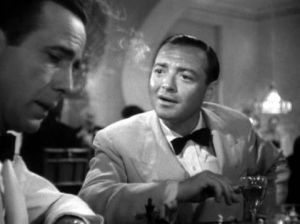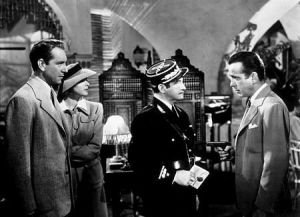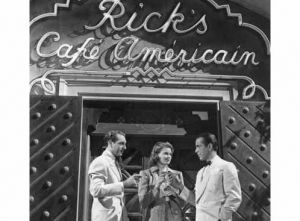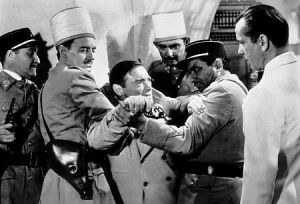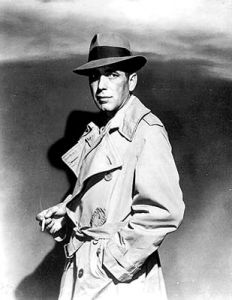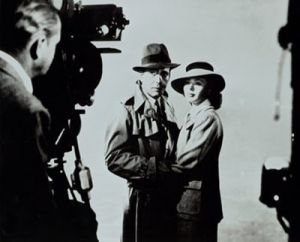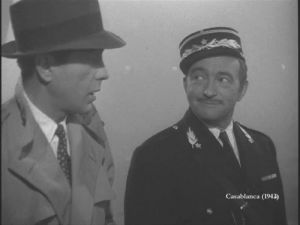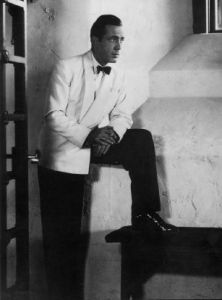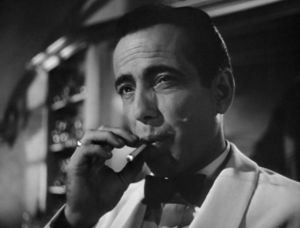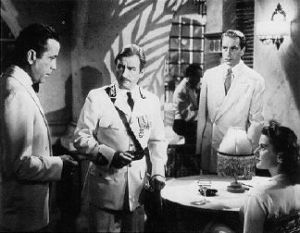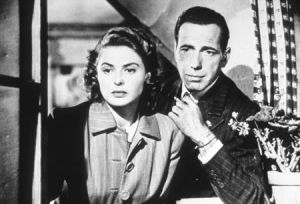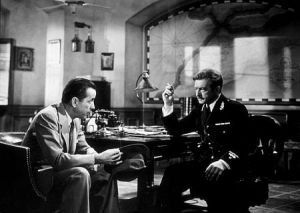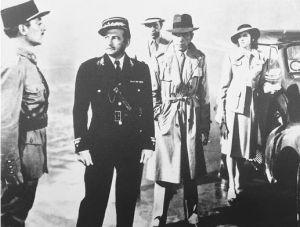Casablanca卡萨布兰卡/北非谍影
Casablanca (卡萨布兰卡又称北非谍影) is a 1942 American romantic drama film directed by Michael Curtiz. The film focuses on a man torn between, in the words of one character, love and virtue. No one involved with its production expected Casablanca to be anything out of the ordinary. The film was a solid, if unspectacular, success in its initial run, rushed into release to take advantage of the publicity from the Allied invasion of North Africa a few weeks earlier. Its characters, dialogue, and music have become iconic.
Directed by: Michael Curtiz
Produced by: Hal B. Wallis
Written by: Julius J. Epstein, Philip G. Epstein, Howard Koch, Casey Robinson
Music by: Max Steiner
Cinematography: Arthur Edeson
Editing by: Owen Marks, Studio Warner Bros.
Distributed by: Warner Bros.
Release date: November 26, 1942 (New York City premiere)
January 23, 1943 (US general release)
Running time: 102 minutes
Country: United States
Language: English
Genre: War Drama Romance
Color: Black and White
Humphrey Bogart as Rick Blaine.
Ingrid Bergman as Ilsa Lund.
Paul Henreid as Victor Laszlo.
Claude Rains as Captain Louis Renault.
Conrad Veidt as Major Heinrich Strasser.
Sydney Greenstreet as Signor Ferrari, a rival clubowner.
Peter Lorre as Signor Ugarte.
Dooley Wilson as Sam.
Joy Page as Annina Brandel, the young Bulgarian refugee.
Madeleine LeBeau as Yvonne, Rick's soon-discarded girlfriend.
S. Z. Sakall as Carl, the waiter.
Curt Bois as the pickpocket.
John Qualen as Berger, Laszlo's Resistance contact.
Leonid Kinskey as Sascha, the Russian bartender in love with Yvonne.
Marcel Dalio as Emil the croupier.
Helmut Dantine as Jan Brandel, the Bulgarian roulette player married to Annina Brandel.
Norma Varden as the Englishwoman whose husband has his wallet stolen.
Jean Del Val as the French police radio announcer who reports the news of the murder of the two German couriers.
Torben Meyer as the Dutch banker who ran "the second largest banking house in Amsterdam".
Dan Seymour as Abdul the doorman.
Gregory Gaye as the German banker who is refused entry to the casino by Rick.
William Edmunds as a contact man at Rick's.
Rick Blaine (Humphrey Bogart) is a bitter, cynical American expatriate living in Casablanca. He owns and runs "Rick's Café Américain", an upscale nightclub and gambling den that attracts a mixed clientele including Vichy French, Italian, and Nazi officials; refugees desperately seeking to reach the United States, as yet uninvolved in the war; and those who prey on them. Although Rick professes to be neutral in all matters, it is later revealed that he had run guns to Ethiopia to combat the 1935 Italian invasion, and fought on the Republican side in the Spanish Civil War against Francisco Franco's Nationalists.
Ugarte (Peter Lorre), a petty criminal, arrives in Rick's club with "letters of transit" obtained through the murder of two German couriers. The papers allow the bearer to travel freely around German-controlled Europe and to neutral Portugal, and from there to America. The letters are almost priceless to any of the continual stream of refugees who end up stranded in Casablanca. Ugarte plans to make his fortune by selling them to the highest bidder, who is due to arrive at the club later that night. However, before the exchange can take place, Ugarte is arrested by the local police under the command of Captain Louis Renault (Claude Rains). However, Ugarte had entrusted the letters to Rick. Then, Ugarte dies in police custody without revealing the location of the letters.
At this point, the reason for Rick's bitterness re-enters his life. His ex-lover, Norwegian Ilsa Lund (Ingrid Bergman) arrives with her husband, Victor Laszlo (Paul Henreid), a fugitive Czech Resistance leader long sought by the Nazis. The couple need the letters to leave for America to continue his work. German Major Strasser (Conrad Veidt) arrives to see to it that Laszlo does not succeed. When Laszlo speaks with Signor Ferrari (Sydney Greenstreet), a major figure in the criminal underworld and Rick's friendly business rival, Ferrari divulges his suspicion that Rick has the letters. Laszlo meets with Rick privately, but Rick refuses to part with the documents, telling Laszlo to ask his wife for the reason. They are interrupted when Strasser leads a group of officers in singing "Die Wacht am Rhein", a patriotic German song. In response, Laszlo orders the house band to play "La Marseillaise", the French national anthem. When the band looks to Rick for guidance, he nods his head. Laszlo starts singing, alone at first, then long-suppressed patriotic fervor grips the crowd and everyone joins in, drowning out the Germans. In retaliation, Strasser has Renault shut down the club.
That night, Ilsa confronts Rick in the deserted cafe. When he refuses to give her the letters, she threatens him with a gun, but is unable to shoot, confessing that she still loves him. She explains that when she first met and fell in love with him in Paris, she believed that her husband had been killed trying to escape from a Nazi concentration camp. Later, with the German army on the verge of capturing the city, she learned that Laszlo was in fact alive and in hiding. She left Rick without explanation to tend to an ill Laszlo.
With the revelation, Rick's bitterness dissolves and the lovers are reconciled. Rick agrees to help, leading her to believe that she will stay behind with him when Laszlo leaves. When Laszlo unexpectedly shows up, after having narrowly escaped a police raid on a Resistance meeting, Rick has waiter Carl (S. Z. Sakall) secretly take Ilsa back to the hotel while the two men talk.
Laszlo reveals that he is aware of Rick's love for Ilsa and tries to get Rick to use the letters to at least take her to safety. However, the police arrive and arrest Laszlo on a minor, trumped-up charge. Rick convinces Renault to release Laszlo by promising to set him up for a much more serious crime: possession of the letters of transit. To allay Renault's suspicions about his motives, Rick explains that he and Ilsa will be leaving for America. However, when Renault tries to arrest Laszlo, Rick double crosses Renault, forcing him at gunpoint to assist in their escape. At the last moment, Rick makes Ilsa board the plane to Lisbon with her husband, telling her that she would regret it if she stayed.
Major Strasser drives up by himself, having been tipped off by Renault, but Rick shoots him when he tries to intervene. When police reinforcements arrive, Renault pauses, then tells his men to round up the usual suspects. Once they are alone, Renault suggests to Rick that they leave Casablanca and join the Free French at Brazzaville. They walk off into the fog with one of the most memorable exit lines in movie history: "Louis, I think this is the beginning of a beautiful friendship."
Wallis' first choice for director was William Wyler, but he was unavailable, so Wallis turned to his close friend Michael Curtiz. Curtiz was a Hungarian Jewish. He had come to the U.S. in the 1920s, but some of his family were refugees from Nazi Europe. Curtiz was concerned to use images to tell the story rather than for their own sake. However, he had relatively little input into the development of the plot. The second unit montages, such as the opening sequence of the refugee trail and that showing the invasion of France, were directed by Don Siegel.
The New York City-born Humphrey Bogart (as Rick Blaine) became a star with Casablanca. Earlier in his career, he had been typecast as a gangster. Rick was his first truly romantic role. Ingrid Bergman was cast as Ilsa Lund. Other actresses considered for the role of Ilsa had included Ann Sheridan, Hedy Lamarr and Michèle Morgan. Paul Henreid (as Victor Laszlo) an Austrian actor who emigrated in 1935, was reluctant to take the role , until he was promised top billing along with Bogart and Bergman. Henreid did not get on well with his fellow actors and he considered Bogart "a mediocre actor", while Bergman called Henreid a "prima donna" (a female operatic star). Conrad Veidt (as Major Heinrich Strasser) was a German actor who escaped from the Nazis and ironically was best-known for playing Nazis in U.S. films. Dooley Wilson (as Sam) was one of the few American members of the cast. A drummer, he could not play the piano. Hal Wallis had considered changing Sam to a female character and even after shooting had been completed, Wallis considered dubbing over Wilson's voice for the songs. Part of the emotional impact of the film has been attributed to the large proportion of European exiles and refugees among the extras and in the minor roles. A witness to the filming of the "duel of the anthems" sequence said he saw many of the actors crying, and "realized that they were all real refugees". The German citizens among them nevertheless had to keep curfew as enemy aliens. Ironically, they were frequently cast as the Nazis from whom they had fled.
The film was based on Murray Burnett and Joan Alison's then-unproduced play "Everybody Comes to Rick's". The play was inspired by a trip to Europe made by Murray Burnett in 1938, during which he visited Vienna shortly after the Anschluss, where he saw discrimination by Nazis first-hand. In the south of France, he came across a nightclub, which had a multi-national clientele and the prototype of Sam, the black piano player. In the play, the Ilsa character was an American named Lois Meredith and did not meet Laszlo until after her relationship with Rick in Paris had ended, and Rick was a lawyer.
The first writers to work on the script were the Epstein twins, Julius and Philip, who removed Rick's background and added more elements of comedy. The other credited writer, Howard Koch, came later, but worked in parallel with them, despite their differing emphases, Koch highlighted the political and melodramatic elements. The uncredited Casey Robinson contributed to the series of meetings between Rick and Ilsa in the cafe. Curtiz seems to have favored the romantic parts, insisting on retaining the Paris flashbacks. The film ran into some trouble from Joseph Breen of the Production Code Administration (the Hollywood self-censorship body), who opposed the suggestions that Captain Renault extorted sexual favors from his supplicants, and that Rick and Ilsa had slept together in Paris. Some changes were made, but both remained strongly implied in the finished version.
Shooting began on May 25, 1942 and was completed on August 3. The film cost a total of $1,039,000 ($75,000 over budget),[8] not exceptionally high, but above average for the time. The entire picture was shot in the studio, except for the sequence showing Major Strasser's arrival which was filmed at Van Nuys Airport, and a few short clips of stock footage views of Paris. The street used for the exterior shots had recently been built for another film, The Desert Song, and redressed for the Paris flashbacks. It remained on the Warners backlot until the 1960s.
The set for Rick's was built in three unconnected parts, so the internal layout of the building is indeterminate. In a number of scenes, the camera looks through a wall from the cafe area into Rick's office. The background of the final scene, which shows a Lockheed Model 12 Electra Junior airplane with personnel walking around it, was staged using midget extras and a proportionate cardboard plane. Fog was used to mask the model's unconvincing appearance. The difference between Bergman's and Bogart's height caused some problems. She was some two inches (5 cm) taller than Bogart, and claimed Curtiz had Bogart stand on blocks or sit on cushions in their scenes together.
Wallis wrote the final line ("Louis, I think this is the beginning of a beautiful friendship.") after shooting had been completed. Bogart had to be called in a month after the end of filming to dub it. Later, there were plans for a further scene, showing Rick, Renault and a detachment of Free French soldiers on a ship, to incorporate the Allies' 1942 invasion of North Africa. However it proved too difficult to get Claude Rains for the shoot, and the scene was finally abandoned after David O. Selznick judged that it would be a terrible mistake to change the ending.
The music was written by Max Steiner, who was best known for the score for Gone with the Wind. The song "As Time Goes By" by Herman Hupfeld had been part of the story from the original play. Steiner wanted to write his own composition to replace it, but Bergman had already cut her hair short for her next role and could not re-shoot the scenes which incorporated the song, so Steiner based the entire score on it and "La Marseillaise", the French national anthem, transforming them to reflect changing moods.
Particularly notable is the "duel of the songs" between Strasser and Laszlo at Rick's cafe. In the soundtrack, "La Marseillaise" is played by a full orchestra. Originally, the opposing piece for this iconic sequence was to be the "Horst Wessel Lied", the de facto second national anthem of Nazi Germany, but this was still under international copyright in non-Allied countries. The opening bars of the "Deutschlandlied", the national anthem of Germany, is featured throughout the score as a motif to represent the Germans, much as "La Marseillaise" is used to represent the Allies.
Many subsequent films have drawn on elements of Casablanca. "Passage to Marseille" reunited Bogart, Rains, Curtiz, Greenstreet and Lorre in 1944, while there are many similarities between Casablanca and two later Bogart films, "To Have and Have Not" (1944) and "Sirocco" (1951). Parodies have included the "Marx Brothers' A Night in Casablanca" (1946), "The Cheap Detective" (1978), "Barb Wire" (1996), and "Out Cold" (2001), while it provided the title for the 1995 hit "The Usual Suspects". Caboblanco (1980) was "a South American-set retooling of Casablanca". Steven Soderbergh paid homage to Casablanca with "The Good German" (2006), a post-World War II Berlin-set murder mystery shot in black and white using technology from the period in which Casablanca was made. The film ends with a scene between two former lovers at an airport. The film's poster echoes the iconic one for Casablanca.
Casablanca itself was a plot device in the science-fiction television movie "Overdrawn at the Memory Bank" (1983), made a similar, though much less pivotal, appearance in "Terry Gilliam's dystopian Brazil" (1985). Warner Bros. produced its own parody of the film in the homage "Carrotblanca", a 1995 Bugs Bunny cartoon included on the special edition DVD release. Another cartoon version was produced by 30-Second Bunnies Theatre. It also figured prominently in "Black Cat", "White Cat", where one of the characters is obsessed with the closing line. Television has also drawn on the fame of this film. The character Orville "Rick" Wright from the series "Magnum, P.I."was initially based on Rick Blaine, according to the show's producer, Donald Bellisario. In the pilot, Wright owned and managed a disco named "Rick's Cafe Americaine". On "Star Trek" (星际旅行): Deep Space Nine, the relationship between Security Chief Odo and bar owner Quark owed a significant amount to Casablanca.
In literature, Robert Coover's short story "You Must Remember This" uses exact quotes from the movie and includes an explicit sex scene between Rick and Ilsa, while the science-fiction novella "The Children's Hour" in the series The Man-Kzin Wars, created and edited by Larry Niven, has a plot which draws many elements from Casablanca.
Narrator: With the coming of the Second World War, many eyes in imprisoned Europe turned hopefully, or desperately, toward the freedom of the Americas. Lisbon became the great embarkation point. But, not everybody could get to Lisbon directly, and so a tortuous, roundabout refugee trail sprang up - Paris to Marseilles... across the Mediterranean to Oran... then by train, or auto, or foot across the rim of Africa, to Casablanca in French Morocco. Here, the fortunate ones through money, or influence, or luck, might obtain exit visas and scurry to Lisbon; and from Lisbon, to the New World. But the others wait in Casablanca... and wait... and wait... and wait.
French officer: To all officers - two German couriers carrying important official documents murdered on train from Oran. Murderer and possible accomplices headed for Casablanca. Round up all suspicious characters and search them for stolen documents. Important.
Rick: Last night we said a great many things. You said I was to do the thinking for both of us. Well, I've done a lot of it since then, and it all adds up to one thing: you're getting on that plane with Victor where you belong.
Ilsa: But, Richard, no, I... I...
Rick: Now, you've got to listen to me! You have any idea what you'd have to look forward to if you stayed here? Nine chances out of ten, we'd both wind up in a concentration camp. Isn't that true, Louie?
Captain Renault: I'm afraid Major Strasser would insist.
Ilsa: You're saying this only to make me go.
Rick: I'm saying it because it's true. Inside of us, we both know you belong with Victor. You're part of his work, the thing that keeps him going. If that plane leaves the ground and you're not with him, you'll regret it. Maybe not today. Maybe not tomorrow, but soon and for the rest of your life.
Ilsa: But what about us?
Rick: We'll always have Paris. We didn't have, we, we lost it until you came to Casablanca. We got it back last night.
Ilsa: When I said I would never leave you.
Rick: And you never will. But I've got a job to do, too. Where I'm going, you can't follow. What I've got to do, you can't be any part of. Ilsa, I'm no good at being noble, but it doesn't take much to see that the problems of three little people don't amount to a hill of beans in this crazy world. Someday you'll understand that. Now, now... Here's looking at you kid.
When Rick is listening to Annina explain the situation in Bulgaria with his back to the camera, we see him take a drink of brandy. The shot switches before he put his glass down. But in the new shot with the camera facing him, Rick only has a cigarette in his hand and the brandy glass isn't visible.
While chatting to Captain Renault outside the Café Américain, Rick lights a cigarette, then in the next shot, lights another.
When the trumpet and trombone players raise their instruments to play "La Marseillaise", the music begins a split second before they start playing.
"combination of fine performances, engrossing story and neat direction" and the variety of moods, action, suspense, comedy and drama that makes Casablanca an A-1 entry at the b.o. Bogart, as might be expected, is more at ease as the bitter and cynical operator of a joint than as a lover, but handles both assignments with superb finesse."
—The trade paper Variety
"The Warners... have a picture which makes the spine tingle and the heart take a leap."
—New York Times
"The film is popular because the people in it are all so good and that it is 'a wonderful gem'. As the Resistance hero, Laszlo is ostensibly the most noble, although he is so stiff that he is hard to like."
—Critic Roger Ebert
I've been watching Casablanca over and over again since I bought the Special Edition DVD, and is there any film out there one can watch again and again without ever being tired of it? And does any film appeal to a broader audience? Just everything about it seems to be as close to perfection as it only can be.
Casablanca remains Hollywood's finest moment, a film that succeeds on such a vast scale not because of anything experimental or deliberately earthshaking in its design, but for the way it cohered to and reaffirmed the movie-making conventions of its day. This is the film that played by the rules while elevating the form, and remains the touchstone for those who talk about Hollywood's greatness.
Oscar(Academy Awards, USA)
Best Actor in a Leading Role, Humphrey Bogart
Best Actor in a Supporting Role, Claude Rains
Best Cinematography, Black-and-White, Arthur Edeson
Best Film Editing, Owen Marks
Best Music, Scoring of a Dramatic or Comedy Picture, Max Steiner
DVD Exclusive Awards
Best Overall DVD, Classic Movie (Including All Extra Features), Kristin Grosshandler
Lesley Wynn, Beth Wetzel
Oscar(Academy Awards, USA)
Best Director, Michael Curtiz
Best Picture
Best Writing, Screenplay,Julius J. Epstein , Philip G. Epstein, Howard Koch
Las Vegas Film Critics Society Awards
Best DVD (Packaging, Design and Content)
No.2 on 1998 - AFI's 100 Years... 100 Movies
No.37 on 2001 - AFI's 100 Years... 100 Thrills
No.1 on 2002 - AFI's 100 Years... 100 Passions
No.4 on 2003 - AFI's 100 Years... 100 Heroes and Villains: Rick Blaine, hero
No.2 on 2004 - AFI's 100 Years... 100 Songs: "As Time Goes By"
No.32 on 2006 - AFI's 100 Years... 100 Cheers
No.3 on 2007 - AFI's 100 Years... 100 Movies (10th Anniversary Edition)
附件列表
词条内容仅供参考,如果您需要解决具体问题
(尤其在法律、医学等领域),建议您咨询相关领域专业人士。
如果您认为本词条还有待完善,请 编辑
上一篇 P.S. I Love You 附注我爱你 下一篇 The Shawshank Redemption肖申克的救赎

